![[Home]](https://ludism.org/logo/sclogo160.png)
Seattle Cosmic met again at 5:00 PM on 29 March at the Tukwila condominium of Dave_Howell? and Eric_Yarnell,_ND?. Present in rough order of appearance were Dave and Eric; newcomer Michael Denman, visiting from the Houston Gamers group; Mark_Haggerty? and Meryl_Douglas?; Jay_Lorch?, Nat_Dupree? and Steve_Dupree?; Kisa_Griffin? and Meredith_Hale?; Marty_Hale-Evans?, Ron_Hale-Evans? (me), and Alex_Rockwell?; and Tim "AlphaTim" Schutz.
This was the fifth Saturday of the month, literally about as rare as a blue moon, so we had decided we'd do something different and meet at Dave and Eric's for the first time. Three people cancelled at the last minute, David_Adams? was hosting his birthday party at his house in West Seattle, and some people might have not have wanted to bother finding the new location, all of which probably contributed to slightly low attendance. However, although parking was a little short and the condo got a bit warm from having so many people in it, Dave and Eric served up a delicious Mexican food bar.

Dessert was homemade white chocolate cheesecake. Dave H made pear and lavender sauces to accompany it. Sadly, by the time I got to the lavender sauce, it was all but gone. It had an incredible, subtle floral taste. The pear sauce was also very good, though.
As mentioned, 29 March is the birthday of Dave Adams. It is also the birthday of Timothy_Higgins?, who was not present, instead celebrating privately with his sweetie. As well, the 30th was Marty's birthday. Since game night lasted until about 3:00 AM, we got to span the birthdays of all three group members. Happy birthday, Dave, Tim, and Marty!
--Ron_Hale-Evans?
It was a good thing, actually, that attendance was slightly low. I think there were maybe two table-sides unclaimed; our condo isn't large, and we were using pretty much every table and chair we have, as well as all the available floor space. I was astonished that it didn't feel more crowded; people managed to move from hither to thither without inordinate bumping and collision, even during the plate-dishing phase of the taco dinner.
--Dave_Howell?
Thanks very much to our new hosts! The taco buffet was great and it didnt feel crowded (barely). Happy Birthday to all of the birthday folks! I only knew about Dave's....
--Alex_Rockwell?
The taco buffet was "wicked awesome" as we used to say in Massachusetts. Thanks Dave & Eric!
--Steve_Dupree?
It was indeed wicked awesome! That's my lovely dinner gracing the front page!
--Meredith_Hale?
Before we arrived, Dave Howell, Eric Yarnell, Michael Denman, and Meryl Douglas played a game of Bitin'_Off_Hedz?.
Seattle Cosmic irregular Travis Eberle remarks on this game on his BoardgameGeek trade page, "Ack. Chutes and Ladders with dinos. Where's the strategy?", but I'm sure Dave Howell would disagree; see his CheapassGames article. And presumably Dave could find the strategy, because he won.
--Ron_Hale-Evans?
Well, there's certainly a lot more strategy than Chutes and Ladders. It's actually a dreadfully specious comparison, because the biggest problem with Hedz is that there's too much player interaction. I actually got my double-sized colorized Hedz board out just to show it off, and warned the players that even James Ernest will tell you it's not his best game by a long shot, but there was a clamor to take it out for a spin, so we did.
We used the highly-recommended optional rules for abilities based on dinosaur type, and Eric took his personal shark as a playing piece, which probably helped him take the lead. He made it almost to the end without incident, before Meryl nailed him with a rock while he was stuck in the mud pit right near the end. That's very unusual; usually three or four people have been sent back to start by the time somebody gets near the end.
I'd had my head bitten off early in the game, but I was playing the Tyrannosaurus, so I had greater movement control (may choose to ignore one movement die), and bit off a few heads myself. I believe one of the players also failed to Learn To Fly at the appropriate time, and drowned, also ending up back at Start, so I was the second player to reach the end, and had done so with an adequate supply of rocks, which can not only be thrown at other players, but also dropped to allow a reroll of one die. Drop enough rocks, and you can get the number you need to win the game by the exact count necessary, which I did.
In playtesting, I think we played it with eight once, but realistically, with three, everybody's very far apart, and it's mostly decided by who rolls well, and with more than five, there are so many dinos that it will take a number of attempts before somebody amasses enough rocks to bonk the competition on the way up and have enough left to reroll to win. The key is to end up on the space that the last player to try to win was on, because there will be a big pile of rocks there. It's also very very important to push players to not piddle around when it's their turn; if people chat instead of rolling or otherwise waste time on their turn, the game will rapidly become interminable.
My custom-made board, the plastic dinosaurs, and actual rocks do make the game more tactile and fun, but really, it's a good game for older kids or adults who are in a silly mood.
--Dave_Howell?
When our party arrived, four people were still playing The_Amazing_Labyrinth?.
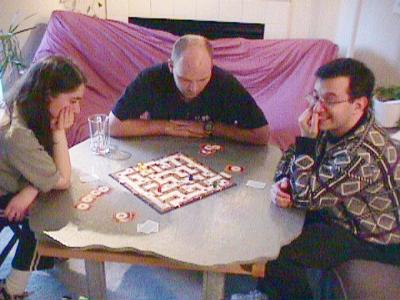
Nat and Mark, amazed; Jay, apprehensive.
Scores
| PLAYER | SCORE |
| Mark H | 6 |
| Jay L | 5 |
| Nat D | 5 |
| Steve D | 4 |
--Ron_Hale-Evans?
IIRC, Mark won, Nat and Jay had 5 out of 6 treasures each, and I had 4.
--Steve_Dupree?
Around 5:35, a five-player game of Mare_Nostrum? started. Meredith was the scorekeeper, and noted "Kisa wins with Pyramids at 7:57. Again, whoever is Director of Commerce wins -- fighting is completely useless." Kisa adds that Michael was second because he had built two Heroes and would have been able to build again that turn.
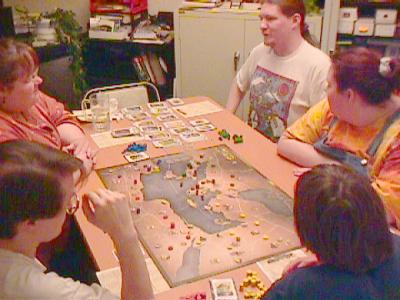
Another round of frustrating fun with Mare Nostrum.
Scores
| PLAYER | NATION | SCORE |
| Kisa G | Rome | 1st |
| Michael D | Egypt | 2nd |
| Marty H-E | Carthage | ??? |
| Meredith H | Greece | ??? |
| Meryl D | Babylon | ??? |
Kisa received a poster for the game Gang_of_Four? that was donated to the prize bag by Nat and Steve Dupree.
--Ron_Hale-Evans?
I would definitely agree with the frustrating part, though not the fun part. After the first time playing this game I was asked to give it another chance. And I did. And I stand by my beliefs that this game is skewed heavily toward whomever is the Director of Commerce and that if you spend *any* of your commodities or taxes on any aspect of fighting, you can kiss the game goodbye. Also, if by chance your country is fairly even in taxes and commodities, it's virutally impossible to score any of the higher priced items that you need to win the game.
--Meredith_Hale?
A game of Elfenland started around 5:50 PM.
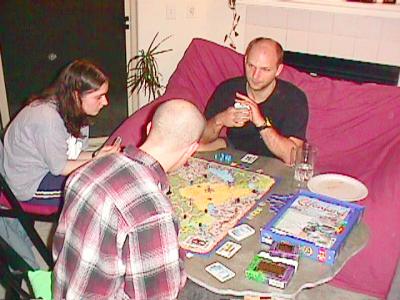
Bald elf: Mark H. REALLY bald elf: Steve D. Also, ElfenNat.
Scores
| PLAYER | SCORE |
| Mark H | 18 |
| Nat D | 17 |
| Steve D | 17 |
First thing I noticed when I arrived: Steve shaved his head! That is all. Oh yeah, and Elfenland is a great game, and a good introductory game to play with non-gamers.
--Alex_Rockwell?
I used to shave my head all the time. I've just been lazy lately. (for 6 years I had to visit the Marines once a month for reserve duty, which kept my haircuts on a regular schedule).
I did great the first two turns, visiting 6 villages to Nat's 5 and Mark's 4 per round. Unfortunately, at the end Nat was forced to make a decision between letting me tie for first with her in 3rd and letting Mark win and tying with me for 2nd, depending on how she played her obstacle, and she reasonably chose to advance her position as much as possible. Mark did very well on his last turn, getting something like 5 points, especially considering that most of the cylinders on the board were already picked up and everyone was using their last chance to drop an obstacle.
--Steve_Dupree?
Due to a dearth of piecepack game reviews, I had proposed that anyone interested join me in playing one or two piecepack games every week at Seattle Cosmic, so that we could post reviews on the Wiki. AlphaTim and Kisa_Griffin? expressed interest. Eric_Yarnell,_ND? has since done so as well, and Marty_Hale-Evans? has said she may help playtest on occasion. Including me, that's potentially five people available to playtest piecepack games on a given game night, not counting anyone else whose interest is piqued.
Kisa and Tim suggested that games be picked ahead of time so we could study the rules online and not waste time learning them at game night. Tim made the suggestion that we choose a few games each week and establish an order of play, so that we would always know what we would play the next week.
This week, since I had made the piecepack game suggestion so close to game night, we selected a couple of simple games that had received informal honourable mentions in the recent contest. We chose Froggy_Bottom? by Clay Blankenship and San_Andreas? by James Kyle. Both looked fun, and neither had more than about a page of rules if you factored out illustrations. Unfortunately, Kisa was playing other games most of the night, so we couldn't play San Andreas, which requires at least three players. Froggy Bottom only needs two, however, and it's quick, so Tim and I played a couple of games of it.
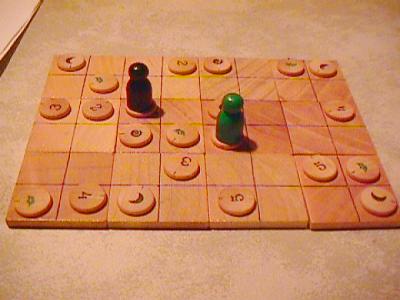
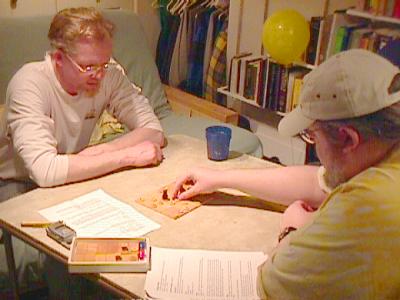
1. The Froggy Bottom Board.
2. The Froggy Bottom Boys.
The "honourable mention" from Michael Schoessow in the recent contest ran as follows:
As you might guess, Froggy Bottom is a race between two frogs hopping and swimming from lily pad to lily pad in a pond. The first frog to touch all of its pads and return home is the winner.
Players take turns placing their opponent's "lily pads" (coins) face-down (suit-side-up), then alternate placing neutral coins face-down. All the neutral coins are then flipped face-up. Numbers show how far players can hop from that pad. When you land on your own lily pad, you flip it face-up. (A face-up coin is never flipped face-down again, and you shuffle all the coins before you place them, so I have no idea what Mike means by a "memory element".)
As mentioned, the number on a pad determines how far you can hop from it. Aces and Nulls count as 1. On your turn, you may either swim one space orthogonally, hop orthogonally the number of spaces on your current pad (you may "chain" a series of hops together in the same turn, but a coin must already be face-up before you hop from it), or move an empty, face-up lily pad one space orthogonally.
Tim and I played our first game incorrectly. We made two errors: (1) We forgot you may hop the number of spaces on the pad you start from. (2) We forgot you may only use a number that you landed on by exact count. I won this "variant" by one move in our first game. We had a nice little contest of wills at one point in which we each wanted to score the other's lily pad, but neither would hop off first, so we just moved lily pads around for a few turns.
Tim won the second game, also by one move, with a snazzy multiple jump that took him directly to his home pad. (Is "home pad" redundant?) Our first game lasted about 20 minutes if you included the 10-minute setup and rules refresher. The second game was a lot closer to 10 minutes in total, since we knew what we were doing. We were also moving faster, since we were hopping the number of the pad we started on.
We had thought in the first game that the placement of neutral pads meant little. However, by the second game, Tim sussed onto the idea that it's a good idea to place a neutral coin in between two of your lily pads if you can, to speed hopping between them. I suspect this contributed to his decisive multiple hop at the end of the game, while I wasted tempo.
We were baffled as to why Froggy Bottom was entered in the Changing Landscapes contest, but perhaps the designer considered the sliding lily pads to be the changing game board. This is a bit of a stretch, however, and it was hardly a prominent feature of the games we played. Nevertheless, Froggy Bottom is good fun and recommended as a two-player filler. Plus, the name sounds dirty. :)
Comments?
--Ron_Hale-Evans?
Past newsletters record a preposterous unbroken series of victories by Alex against both Dave Howell and Eric Yarnell playing Netrunner. Eric and I decided that the problem was we were having too much fun trying to make dubious ideas work at all as decks, and would have to actually Get Serious and build some decks that would Teach Alex a Lesson, especially since he'd only been playing for a couple weeks and all.
First we designed a corporation similar to his, but better. It's a speed deck based around Corporate War, but the ice was carefully selected (and we drew heavily on our Proteus stock, which Alex has very little of) to take advantage of the large amounts of money that are a side effect of the deck. Given that we had a corp who's agenda was solely to make war on other corporations, tended to have massive cash reserves, and complex, sophisticated defenses, it was obvious that the deck must be named Microsoft.
Then we built a runner specifically to beat that deck. We named that Fever, since Alexander the Great died of fever. Microsoft was an easy deck to play, although as we expected, not really much fun; it's very predictable. Fever was much harder, as it had an array of tools that needed to be carefully applied in order to slow a speed deck down enough to beat it. Since I have more experience with Netrunner and trading card games in general, Eric decreed that when next we met Alex, he'd take Microsoft, and I'd get Fever.
Tonight was the night that Alex would meet Microsoft and Fever. The first round started around 7:00, with Eric's Microsoft beating Alex's runner 3 to 9. (Corporate War is worth 3, so Alex managed to score one of the agenda before Eric won). Alex (correctly) felt that he'd been hampered by some unfortunate deck draws; he'd had to discard nearly half his deck before he got the clowns and icebreakers that were the key components of his strategy. What he didn't realize was that Microsoft had also had some bad card distribution issues. In the second game, Alex's runner was up and running at full speed much faster, but to no avail; he lost the second game 0 to 9.
Scores
| PLAYER | GAME 1 | GAME 2 |
| Eric Y (Corporation "Microsoft") | 9 | 9 |
| Alex R (Runner "Hyper Clown") | 3 | 0 |
Alas, Fever did not fare so well. The three weeks since our last battle were time enough for Alex to modify both of his decks, and his corporation now had a new piece of agenda which made other agenda easier to advance. Also, we'd failed to notice that Corporate Ally, which makes agenda harder to advance, was Unique, and thus Fever couldn't play more than one at a time. I lost two games before finally managing to pull out a token victory against the unexpectedly enhanced corporation.
Scores
| PLAYER | GAME 1 | GAME 2 | GAME 3 |
| Alex R (Corporation "ASD/Corp War") | 7 | 8 | 6 |
| Dave H (Runner "Fever") | 1 | 2 | 7 |
Since Alex has been bidding on eBay for specific Netrunner cards to further improve his decks, I think from now on, we're just going to have to conveniently forget to bring our Netrunner decks whenever he's around, or something. Sigh.
--Dave_Howell?
Well, the first match went very poorly for me, Eric and Dave having designed a corp deck to beat my clown runner. I was expecting them to use Crystal Palace Station Grid, which would stop me from making loads of runs for free, so included a "misc.for-sale", to sell off all my unneeded setup cards once I had everything in play, and generate the bits necessary to pay it. However, they also had sentry ice which could have an unlimited number of subroutines, based on how much they paid for it. This meant that it could be prohibitably expensive for me to get through, as I was foolishly using Shaka as my sentry breaker, under the assumption "I'll get enough bits from the misc.for-sale to use it". I should've stuck with the more expensive to play, but cheaper to use Forward's Legacy.
In the first game I drew half my "stack" (deck of cards), in a couple turns, but couldn't get a single one of my Daemon programs that increases the memory I had available. Thus, I dumped about a third of my stack in the trash. This meant that when I got everything set up, I was one clown program short of what I needed, and Shaka cost me too much to use. Thus, I wasn't able to run for cheap, and Eric was victorious. The second game I got set up fine, but Eric pulled his "Food Fight" ice, with 6 subroutines, and a Crystal Palace Station Grid, and I knew I was doomed.
So the moral of the story is that I need to make a new runner, without any single big weakness.
Against Dave, things went better. I was hurt a lot by cards like Terrorist Reprisal, which Dave had included in order to punish my evil corporation. They were very effective against me. But still I managed to pull off two victories in the first two games. I did a lot of damage with various ice that trashes programs, destroying necessary icebreakers of Dave's, such that he could no longer get through my defenses. But in the final game the runner prevailed, and won a close game.
I had felt from the start that my Corp was the stronger of my decks, and it showed, as its weaknesses were not nearly as large. So I'll be back with new, different decks next week, that Eric & Dave haven't seen before. We'll see how it goes. ;)
I will also try to make a corp deck without Corp War. (That card is unfairly good). Dave & Eric have certainly proven that they can build great decks....now the fun begins. ;)
--Alex_Rockwell?
I think the main goal for me here was to win against Alex's super decks at least once, and then move on. I really prefer playing more subtle but less certain to win decks. In the future, I don't think I will use Fever or Microsoft except to dish a little medicine. I look forward to playing other decks Alex comes up with. I think in the future I know that Corp decks based on Corporate War will not be among those I want to play with or against--powerful but dull.
--Eric_Yarnell,_ND?
I actually think Corp War is really interesting, as it gives an important decision: do I try and build up cash to win the war, and gain even more money, risking that it will be captured, or do I do it quickly and get it safely scored. However, it is overpowered. I will be making a corp deck with no Corp War (or Tycho), and a runner deck with no clowns. Well maybe 1 or 2, if I decide I want them, but not a clown deck.
--Alex_Rockwell?
After Froggy Bottom, Tim and I playtested one of the new games for his HexGames? GameSystem. We played from about 7:20 to 7:55; factoring out the rules explanation, it was about a 20 minute game.
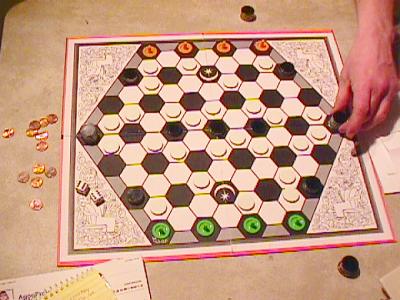
The Bridges board, initial array.
The game is played with four pawns on a side and a number of Reversi? (a.k.a. Othello?) pieces. The object is to move your four pawns from your home bases to your opponent's home bases. The pennies on the left in the photo are used for action points. You get two pennies per turn and can save them between turns, but cannot have more than six pennies at a time. One action point will let you move one of your pawns the number of spaces on one of the two dice (which is then decremented by one; if the die shows 1, it is turned to 6) or place a Reversi piece; two points will let you remove a Reversi piece. You can only move onto black spaces, or spaces with Reversi pieces that are black-side-up in them, so to replace a white Reversi piece that is blocking you costs two to remove it and one to replace it with a black piece, for a total of three. When you land on a stack of disks, they go into your personal store, and you can pay to place them on the board, or turn them in for action points. Every time you move into one of your opponent's home bases, you get a free (but non-bankable) action point. You can pay your opponent to move out of her home base.
Those are the rules in a nutshell, and I'm sure Tim will correct me if I forgot one. In a similar nutshell, Tim, the Master of Disks, beat me 4-2. He didn't get a prize, because, after all, it was his damn game.
Scores
| PLAYER | SCORE |
| Tim S | 4 |
| Ron H-E | 2 |
I thought Bridges was a lot of fun. I believe it qualifies as an AbstractStrategyGame, and another winner from AlphaTim.
Comments?
--Ron_Hale-Evans?
Around 8 PM, four Cosmologists started a game of Reiner Knizia's auction game Ra?. Dave Howell was the big winner. He was awarded the "blockhead" prize: a plastic block and a squirty smiley head in a bag. "Where do you get all this crap?" Eric asked.
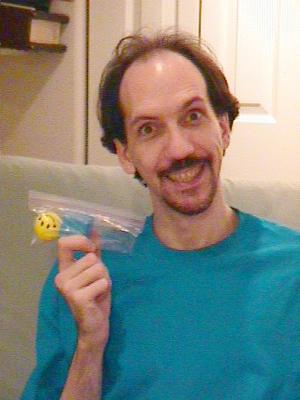
Dave seems dangerously excited about his prize.
Scores
| PLAYER | SCORE |
| Dave H | 48 |
| Jay L | 37 |
| Nat D | 29 |
| Eric Y | 14 |
Comments from the players?
--Ron_Hale-Evans?
This was my second game of Ra and I sucked just as bad this time as the first. I tried really hard to play for tile strength this time, not leaping at what seemed good buys right off. However, I think the way the Ra tiles came out of the bag played really badly against me. After Jay had a round of basically getting to draw to his heart's content and no Ra tiles came out, I got stuck with Ras coming out quickly and I actually ended up never getting to buy anything with my last tile (an 11) during the last turn. The result was I had no civilization advance (-5 points), lost the most pharaohs position I was playing for, and also ended up with the worst bidding tile count (-5 points). Up to that point I believe I was in the running. then blam. I have had concerns about how the Ra tiles work up to this point, but it may be a minor point that just happened to fall against me.
--Eric_Yarnell,_ND?
Certainly Ra has a large luck element, but then again most games of this style do. There is, to make up for it, quite a bit of interesting tactics and a bit of strategy. Dave's building up of a large quantity of land early in the game worked out very well for him, and I hope to get a chance to try that out in some future game when the possibility arises.
--Jay_Lorch?
Four of us started a game of Fresh_Fish? around 8 PM. I had heard a few piecepack fans compare this game to AlienCity because of the way roads are built and how they contribute to scoring. Actually, I had read the rules to the game during a break earlier in the evening, and I thought the games were fairly dissimilar. Certainly knowing how to play Alien City didn't help me much; possibly it hindered me, as I came in last. Although in Alien City you sometimes want to minimise distances along the road (between towers and their customers), in general you are trying to maximise distances (between towers and their competition). Fresh Fish, however, is all about minimising distances. Also, Alien City's scoring is more complex, as you multiply a tower's distance to its nearest competitor by the number of customers it has, whereas in Fresh Fish, you simply add up the distances between your four tiles and the corresponding main tiles (for example, your game store and the game factory). Furthermore, while in Alien City the road is anywhere you don't place a tile (technically, a coin), in Fresh Fish the road must be built out of tiles, and there's a kind of "eminent domain" rule that can trash the tokens you have placed on lots where you plan to build a tile (this happened to me several times).
Another huge difference is that for most practical purposes, Alien City is a PureAbstractStrategyGame?, while Fresh Fish is not -- it has blind bidding and multiple players.
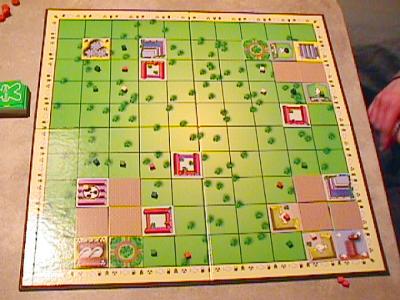
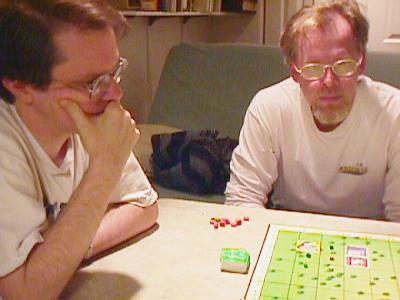
1. Fresh Fish, early in the game. Brown tiles are road tiles.
2. L-R: Michael D and Tim S.
We didn't use the advanced rules, but I got creamed anyway. (I had a couple of short roads, but a couple of really long ones.) Tim Schutz had a really long road for his fish, but lots of money left, which was subtracted from his score. Steve D played many tokens initially on lots diagonal to the main tiles, then learned this was not so good. He did pretty well in the end, but Michael D was the winner. He received a "creepy crawly prize": a bagful of plastic snakes, spiders, toads, and bats. "This is what happens if your fish is not so fresh", someone said. Jay watched the end of the game and remarked, "We're exporting our prizes to Texas! Won't the economy collapse?" (Well, the last I heard, Washington State had the highest unemployment in the country.)
Scores
| PLAYER | SCORE |
| Michael D | 8 |
| Steve D | 12 |
| Tim S | 14 |
| Ron H-E | 17 |
Comments from the players?
--Ron_Hale-Evans?
It was pretty clear that Michael was going to win early on. He was the only one who had played before, and had at least some ideas about the basic strategy. He quickly got two of his markets placed at distances of 1 and 2, and he had plots earmarked for himself in good positions near the other two markets. I would like to try this again now that I know a little more about it; I did fairly well considering my disaterous initial placement.
--Steve_Dupree?
Also starting at 8 PM was Arcana. "Arcana" is the working title for Alex R's first game. We played it at the last EastsideGameGroup? (EGG) meeting, made some suggestions, and Alex brought his new, improved version to Seattle Cosmic for further playtesting. At EGG, Alex sat out and gave helpful suggestions on strategy to the players. This time around, he played it himself. He won, of course, knowing every card, magical item, and spell in the game inside out, where to go on the board to get them, etc. He did not receive a prize. (Marty says his prize was useful feedback.)
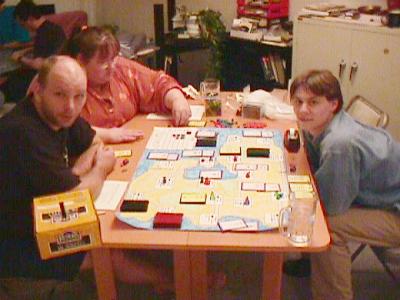
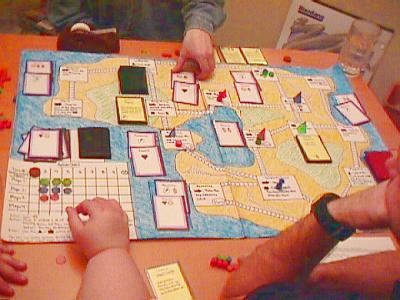
1. Unlike Mark and Alex, Marty is too tired to notice the camera.
2. Arcana board.
Alex's game finished around 10 PM. Marty said, "I'm a gaming casualty. No one should have to playtest that complex a game after Mare Nostrum!"
Scores
| PLAYER | SCORE |
| Alex R | 10 |
| Mark H | 4 |
| Marty H-E | 4 |
Steve_Vall\xE9e? was going to bring his game prototype (Maiestas) for an extra round of playtesting too, but his wife became seriously ill and they had to visit the emergency room. Steve, I hope your wife is OK, and you still have at least one SC game night before you go to the Gathering of Friends!
--Ron_Hale-Evans?
Well this was the second play of my prototype, which is currently named Arcana, but I will probably have to think up a new name for if that name is taken (which I suspect it may be). The basic theme of the game is that players go around collecting spells, magical creatures and items, and most importantly spell components (resources), which they then use to cast spells and score points. The resources are spent on various types of cards, which can be purchased at different locations on the map. Creatures and Magic Items give special abilities and often points, Potions and Charms are 'one-shot' special effects, and Spells can be cast at the Wizard Tower for big points. The game ends once one player has cast 3 spells. (More accurately, a player casting 3 spells signals that that round is the final round, but players who go after them still get the same number of turns).
I played the strategy of "choose low cost, low point scoring spells, and cast them quickly, ending the game before the other players are ready". It worked too well, and I got off 3 spells to my opponents one each. Knowing the game very well, I was able to manage my resources well and ended the game with practically nothing left unused, while my opponents both had a number of resources they couldn't spend on their final turn, which came much quicker than they expected. I decided to take out the cheapest, lowest scoring spells, and replace them with bigger ones, for balance issues.
More importantly however, the others felt that they had a lot of difficulty moving around the board. The movement mechanic is based on the game "Emerald". That is, each wizard will move a number of squares equal to the number of wizards on the space they start. While this works well in Emerald, as players are just traveling in one direction through the board, it is not so simple on a map with lots of different locations that players want to get to, and loops, and so forth. Also, I had each player having a couple of "Apprentices", which would increase movement (they count as a wizard for that purpose), but couldn't do anything on the squares the were on. I didn't have much trouble moving around in the game, because the first thing I did was go and buy magical creatures and items that game me special movement abilities. However, Mark and Marty didn't do the same, and wound up frustrated in their attempts to get anywhere. Marty remarked that if the first thing that you need to do in the game is go and get movement abilities, then you should just START with those abilities, and not have to go get them at the beginning. This made a lot of sense. So I figured that I would see how it works if the players have 4 Wizards, instead of 2 Wizards and 2 Apprentices (in a 3 player game). This should make it much easier to get an active character to the necessary locations.
Furthermore, I want to decrease the complexity of the game, probably by taking out a few of the magic creatures and items. WIth this change, I can take out some of the movement abilities, which wont really be needed anymore.
In short, it was a valuable testing experience, and I got some ideas for improving the game. Thanks to Mark and Marty for playtesting.
Also, from the picture above, yes the tape thingy IS a game component. ;) I was using it as the "first player" marker. (Similar to the "Governor" marker of Puerto Rico. In the first game I played, my round mechanism was too confusing. It was "everyone takes a turn, then one more player takes a turn, and thats the end of the round". This was to rotate who went first each round. (Since new resources come out at the start of the round). In this game I took it out since it had been confusing, but after the first round when Marty remarked that she was going to be last each round, I realized it was a mistake, as the last player would always have the last shot at the resources". So we re-implemented the confusing round mechanism. However, I think that it would work fine to use the more-familiar Puerto Rico (and other games) method of the Governor. That is, The turn order in a 3 player game would go: 1, 2, 3.... 2, 3, 1... 3, 1, 2... 1, 2, 3... etc. This should be less confusing, as it is familiar to players of many games.
--Alex_Rockwell?
LOL. The above is a beautiful example of James Ernest's 'lump of clay' axiom of game design, which is on my list as "Subtraction Is Greater Than Addition." You added a rotation rule to band-aid an unfair access to resource problem. It was confusing. You took it out. Then it was unfair. Now you're going to try a different band-aid, involving a governer? I humbly submit that what needs fixing is the resource system itself. Sounds to me like resources need to appear at the beginning of every turn, not every round. Or maybe never appear near people. Anyway, I counsel looking to alter the source of the problem, not adding rules to mitigate its effects.
--Dave_Howell?
No, the "governor" mechanic is merely the fix by combination of the two mechanics. It is not very confusing, partially because many players have seen it before. It is also fair. It combines "not confusing" with "fair" and thus is what I want. The reason the resources dont reappear all the time is to create some scarcity, and also to make them cycle less often. This is desirable because part of the planning ahead is that you can see the resources that are coming up, and plan a way to get them. The original source of the problem was that the mechanic I was using was confusing. I just didnt come up with a good fix. Now I think I have. The rotation rule was the original rule.
I actually have a significant list of changes to implement for the game, most minor, a couple major.
--Alex_Rockwell?
Meredith, Kisa, and Meryl played a game of Xxxenophile?, the X-rated CollectibleCardGame. It ran from about 8:15 to 9:45. Meredith won and was awarded a "Hippo, Birdies, Two Ewes" prize in honour of all the birthdays that weekend. She remarked that all the plastic animals were "kind of dirty" in light of the fact that she had been playing Xxxenophile. Meredith, I've got news for you: Honi soit qui mal y pense. I could have given you a pencil and you would have thought it was dirty. I'm glad you weren't playing Froggy Bottom with us! :)
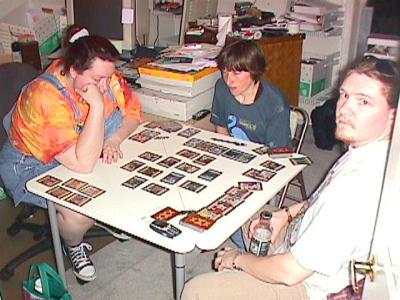
Don't blow up this photo to look at the cards. All you'll see is dots.
Scores
| PLAYER | SCORE |
| Meredith H | 112 |
| Meryl D | 87 |
| Kisa G | 80 |
Comments from the players?
--Ron_Hale-Evans?
I was pretty excited to win Xxxenophile because Kisa *always* beats me. (Ok, that sounds dirty too... especially in the Xxxenophile context! Is that why he looks like a deer in the headlights in this picture?) I got a very handy toy early on that helped me immensely, well, two really. One let my toys count as 3 points each and the other allowed me to match cards by number of symbols, not just the symbols themselves. This allowed me to pop two cards at once almost always, and the chance of finding a match skyrocketed. I really like this game and it's sister game Girl Genius as a light thing to do. It helped boost my mood after Mare Nostrum from 'I never want to ever see another game the rest of my life' to my normal happy self. And as for the comment above, I think I can make just about *anything* sound dirty. It's a bad habit of mine...
--Meredith_Hale?
Around 9:45, several people started a game of Monsters_Ravage_America?, in which giant rubber-suited movie monsters like Godzilla and King Kong trash U.S. cities. Kisa's rubber-suited monster lasted the longest (damn, now even that sounds dirty!), and Kisa was awarded a Chinese dragon, which was the closest thing we had to a monster in the prize bag.
Scores
| PLAYER | SCORE |
| Kisa G | winner, 25 health |
| Dave H | eliminated 3rd |
| Meredith H | eliminated 2nd |
| Eric Y | eliminated 1st |
Comments from the players?
--Ron_Hale-Evans?
Dave and I have undertaken a project to fix some of the errors we have noticed in this game: 1. The strong tendency to reward the winner and punish the loser. 2. The rather absurd end game situation and its arbitrary timing. 3. The imbalanced military. 4. To reduce the luck factor related to dice rolling.
So look forward to future gaming with our revised rule set.
--Eric_Yarnell,_ND?
I would like to play this again with your revised rules. I thought overall it was very fun, and I like the theme and way you play both sides quite a bit. I got knocked out very early and by the time the game ended I had a serious handicap. Fortunately for me, the dice were with me (as they often are) and I managed to at least take out Eric before me in a last-stand-flail.
--Meredith_Hale?
As usual, people broke out a copy of Traumfabrik and played a game. We're definitely going to have some new games on the next iteration of the GamesWePlay page, like Traumfabrik, Netrunner, BANG!?, and so on.
Steve D came out way ahead with 106 points. Alex R heard this score and marveled that it was even possible in Traumfabrik. Do we owe Steve a prize for this one?
Scores
| PLAYER | SCORE |
| Steve D | 106 |
| Jay L | 73 |
| Nat D | 73 |
| Michael D | 56 |
Comments from the players?
--Ron_Hale-Evans?
106 is an amazing score....he pulled out basically all of the awards. Including best directors, worst film, and 2 of the best film awards. That score is about 15 points higher than the second highest I have seen. You owe Steve TWO prizes. ;)
--Alex_Rockwell?
My strategy was to focus on making the best quality movies I could, rather than just trying to complete them quickly. Apparently it worked.
--Steve_Dupree?
Indeed, I'm somewhat glad to see my "be as close to first as possible at parties at all cost" strategy lose by as much as it did. I was starting to worry that that was all there was to the game. There is also a component of having to vary your strategy based on what others are doing; in this game, I was often forced to high bids by other players in order to stay on track with my strategy. In future, I will try to be more adaptive.
--Jay_Lorch?
From about 10:05 to 12:20, ten people played a game of Wise_&_Otherwise?, a PartyGame in which players take turns reading the first half of a proverb from a card while all the other players vie to complete it with plausible endings. You receive one point for each other player who guesses that your ending is the correct one, and two points if you guess the correct ending yourself. As Reader, you receive three points if you have selected a proverb to which no one could guess the correct ending; unfortunately, in our game, we played with the optional rule that you have to roll a six-sided die to determine which of the five proverbs on the card you should choose, and you may only choose a proverb yourself on a 6. This removes some strategy from the game. We also decided not to use the rule that states you receive a couple of points for landing directly on the 10 space on the scoreboard; this seemed to be a bogus attempt to introduce tactics where they didn't belong.
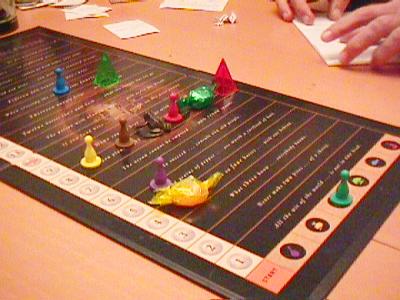
11 pawns, some more conventional than others.
Since we were playing with 10 people, far more than the game is intended for, we had to add a bunch of other items as pawns. Thus, in addition to the pawns that come with the game, you can see in the photo above a green pyramid, a yellow candy, the frog Michael won for Fresh Fish, and so on. We had so many pieces on the board that we had one extra, but couldn't tell which one it was without a tedious roll call, so we just moved our own pieces forward, and the piece that didn't move (the green pawn, nicknamed "Green Guy") scored zero, which made everyone who lost feel a little better.
Memorable moments of the game for me:
"There is an old Yiddish saying: of all the dairy delicacies, the best is... a pair of breasts." I got caught by this ending, which was supplied by Steve D. (I won't tell you what the real ending was, in case it's in your next game.)
"There is an old Scottish saying: Laugh and..." I answered, "...die in haste", which got discarded randomly because it was too close to someone else's answer, which was "...die." When Marty heard my answer, she began to laugh and said, "Laugh in haste, die at leisure." (I hope Marty takes all the time in the world.) Marty said, "Some of these actually sound like secret agent passwords!" Michael observed that unlike Fictionary? (a.k.a. Balderdash?), you didn't need to frame what you wrote in dictionary-speak.
I did badly in the beginning but began to catch on toward the end, and quickly leapt forward. Unfortunately, not quickly enough to win the game, which Steve D did with 21 points. (Jay was next with 20, then me with 19.) I played a game the next day at a family gathering for Marty's birthday, and won with 21 points while the other players were still at 10 or 12. I hope to write up a page of WiseAndOtherwiseStrategy? soon, because I think I can hold my own now.
Michael Denman remarked that the Houston Gamers don't usually play PartyGame``s; Marty replied, "You don't know how rare this is!" True; and I don't think we've ever played a 10-person party game (11 if you count Green Guy).
Scores
| PLAYER | SCORE |
| Steve D | 21 |
| Jay L | 20 |
| Ron H-E | 19 |
| Meryl D | 17 |
| Tim S | 14 |
| Michael D | 12 |
| Mark H | 11 |
| Alex R | 11 |
| Marty H-E | 8 |
| Nat D | 8 |
| Green Guy | 0 |
Steve D was awarded a herd of plastic horses, a frog, and a donkey. Almost everyone left around 12:30, a few minutes after Wise & Otherwise ended. Michael D chatted with me and Marty for awhile. We debated whether Play-Doh has kerosene in it. I said yes, Marty said no. I couldn't find a definitive answer on the Web in a few minutes, but this page says it does. Maybe Marty, data miner extraordinary, can do better. (Yes, Marty, I tried Snopes.)
Michael fled around 1:00 AM after I threatened to start reviewing the night's photos on our digital camera.
Comments from the players?
--Ron_Hale-Evans?
Comment from a non-player: It was my copy of Wise and Otherwise, after all, which I've introduced to my parents as well as Eric's; in my opinion, it's the best party game I've ever played, partially testified to by the fact that hard-core gamers enjoyed it even after overloading it with nearly double the number of players that it's rated for!
--Dave_Howell?
I have played this game before and would say that it is by far my favorite "Party Game", if you dont count Werewolf/Mafia. I actually pulled out to an early lead (tied with one other), after getting four people to vote for my "Of all the dairy delicacies, the best is.....plain milk". Such a simple answer. ;) But then I stalled at 8 points for half the game, while 5 or 6 people passed me. At least I was ahead of the Green Guy, dangit! The Green Guy itself is a good story. After several rounds, it had not moved, and one of the players remarked that they thought there was an extra piece, as there were 11 markers on the board, but only 10 players. After a couple more rounds, it became clear which marker was the extra, however we did remove it, instead leaving it on the board to make sure that even the losers would be far ahead of someone. ;)
--Alex_Rockwell?
It was I who suggested the rule variants that we used, based on an enormous amount of experience playing this game.
I agree with Dave and the game designers that it is better to consider two answers equivalent only if they are identical. However, I've found that most people consider this rule too strict and get bothered by it, which is why I suggested the "house rule" that my former game club always used. The problems that arise without this house rule are as follows. (1) A player often gets annoyed if he submits an answer really close to the right one and doesn't get points for it. (2) A player often gets annoyed when someone else submits virtually the same answer and winds up splitting votes with him (or, worse, taking all his votes).
As for the die-rolling rule, before you reject it, make sure you consider its many advantages. First and foremost, it makes the game go faster when you don't have to wait for the dasher to choose among five choices. In theory, the dasher could do this during the previous turn, but in practice few people remember to do this. Second, generally there are one or two proverbs that are strategically better to pick than the remaining ones, so if you always have the dasher pick the one to optimize strategy you wind up using less than half of the finite number of proverbs provided. Third, having the dasher read every proverb on the card means that the card will always be spoiled for that player the next time it comes up.
--Jay_Lorch?
Um, Jay? The rules explicitly state that the player choosing the proverb reads only the beginning of every proverb on the card, writes her chosen beginning down, then reads and writes down only the corresponding ending. That would "ruin" only 1/6 of a card for the Reader.
If you've been reading all of your card every time you were Reader during your "enormous amount of experience playing", it's no surprise you scored 20, and I'm not sure I want to play this game with you anymore... ;)
--Ron_Hale-Evans?
Quite the conversation! Regarding Jay's explanation of the house rule about 'close;' if a player's annoyed because their submission is a not-quite-match with another one, then either somebody didn't explain the rules correctly, or they're a poor sport, not to put too fine a point on it. In all the games I've played, I think only once has somebody had a 'near miss' with the correct answer. On the other hand, Ron appears to be a bit frustrated because his was randomly voided because somebody judged it too 'close.' I think a house rule that involves that kind of subjective judgement call is just begging for an argument, and is a Very Bad Idea. Word for word, a perfect match, is quite unambiguous and easy to explain, and there are so few rules to Wise and Otherwise anyway, that there's no reason not to tell everybody all of them.
Randomly rolling means you get to be frustrated by seeing a really gonzo beginning that you'd love to do just because it's so strange, and/or getting stuck with one that you think is a little too obvious. More importantly, I strongly disagree that there are 'one or two proverbs that are strategically better.' There are usually one or two that appear better, but deciding which beginning to risk is the fun part. Last Christmas, I oh-so-carefully selected a proverb about wasps, then found to my dismay that the end of the proverb was so completely incomprehensible, that everybody was sure to pick it on the grounds that nobody would have made it up. And they did. Oops. So much for strategically better.
Unless, of course, you're peeking at the endings before you choose one. But that would be cheating.
--Dave_Howell?
Fascinating. I never realized that when you have all the choices to select from, you only get to read the beginnings of the proverbs. This makes sense, and eliminates most of the advantages of the die-rolling rule. If dashers can be counted on to make their decisions among proverbs quickly (or, better yet, in advance), then I agree the die should be cast out of the game.
I guess I should read the rules to party games as meticulously as I read the rules to strategy games!
And, as for the 'close' house rule, it's just that, a house rule. If our group doesn't like it, let's by all means not use it.
--Jay_Lorch?
The last game of the night was Sanctuary?, which is a BoardGame based on the Thieves' World shared universe created by Robert Asprin.
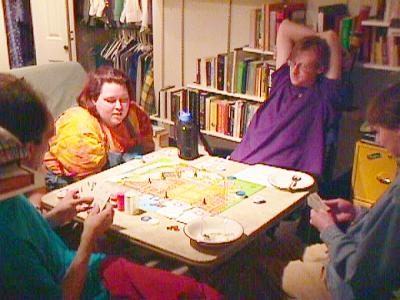
Late-night thievery.
Scores
| PLAYER | SCORE |
| Kisa G | 335 |
| Alex R | 250 + 105 |
| Dave H | 180 + 80 |
| Mer H | 170 + 10 |
| Eric Y | 170 |
I am not familiar with the Thieves' World books and did not play the game, so I can't comment intelligently on it. I don't even understand the scoring system, but I was told Kisa won. He was awarded some greenish-brown six-sided dice donated by Dave and Eric.
Dave and Eric gave Marty a bottle of some very nifty bubble solution for her birthday. You can blow bubbles with it that are super-long-lasting (on the order of hours if you don't pop them manually). Marty was very pleased.
Comments from the players?
--Ron_Hale-Evans?
I'll also note that we've found some bubbles around the condo that have been here for days.
Sanctuary does a remarkably good job of reflecting the literary world of Sanctuary. Unfortunately, that means it also reflects the overly-chaotic, gods-are-toying-with-you nature. I felt this game has way too much random factor in it; it felt very arbitrary. However, we weren't playing with the advanced rules (I have no idea if that'd help or not), and I inadvertently bent the mechanics when I suggested that we use poker chips for money instead of the small, nearly illegible, single-sided paper coins that come with the game. Although the chips were much more pleasant to use, it also meant that a players "cache," was easily counted; the game specifies that it should be secret.
This is actually an utterly bogus rule, since every transaction is public knowledge, so if you've got a a good memory, you can know exactly what everybody has, concealed or not. But the opportunity to be mistaken, or forget, would have meant we probably wouldn't have ganged up on Alex as soon as he had enough money to win.
I hadn't realized that Sanctuary had this 'fake' rule until I wrote this. It was Ra that first caused me to denounce this bit of silliness in scornful tones. Ra also has a rule that says that a player's point score is supposed to be secret, but all transactions are public knowledge. This rule just means I am now required to keep running totals of all players' scores in order to take advantage of information that is available to me, which is very annoying.
--Dave_Howell?
The funny thing is that even with all four other players ganging up on me, they didn't stop me, however, I managed to pull a card from the event deck which warped me to a different position on the board EVERY time I got within one turn of winning. Thus, I would have to begin the journey back to the starting space again, to win, while everyone tried to hit me with the guards. I got hit with a lot of guards during the game. (They are referred to as "Hellhounds".) I think I got hit with more than twice as many of them as the next most hit player. When a Hellhound catches you, the player who moved it rolls a die. On a 1 or 2, it lets you go. On a 3 or 4 you lose a turn, and on a 5 or 6 you lose half your money and go to jail. Every single time, my opponents rolled a 1 or 2. I think it was 6 rolls, but maybe it was only 5. Regardless, it was an extreme amount of luck, only to be nullified by getting ridiculously unlucky with the event cards, at the worst possible times.
Twice I was going to win on my turn, if I did anything but draw a "lose a turn" or "move to a location far from the start space" at the beginning of the turn. Both times I was teleported off into oblivion. Finally, it looked like Dave was going to beat me back to the start space, but then Kisa played a card stealing a bunch of his money, and made it back himself. A fitting end to a highly random and chaotic game. ;)
If I ever play it again, don't both trying to use the Hellhounds against me. You should learn after awhile that I am immune. ;)
Also, Meredith got ridiculously unlucky, and drew a "lose a turn" card about half of her turns. You cant do much about that. This game should not be taken very seriously. ;)
--Alex_Rockwell?
This game, played with the basic rules, sucks. Way too much luck, and way too skewed toward the negative. Perhaps this fits the game milieu, but not that fun. Maybe with the advanced rules it wouldn't suck.
--Eric_Yarnell,_ND?
Ok, so the dice were with me but the cards weren't. I really liked this game. I know I often have to fight for the random in this world, but I find random and chaos very fun. I think a lot of people who consider themselves to be serious gamer types don't enjoy randomness. My take on this phenomenon is that they've spent a lot of time learning about or building strategy and have a hard time with things beyond their control. I can understand that. But I really feel like an element of randomness can even a playing field and add surprise and keep a game interesting. I often find playing heavy strategy games frustrating or boring because the same people always win no matter what strategy I try and they're often so predictable (this is not to say I don't enjoy strategy games sometimes too). Especially if you work out a good strategy and it works and then you do that when you play and you know what's going to happen. Maybe that's why some people play games. I like things to be more spontaneous. I think Sanctuary provided pretty even breaks all around (although the lose a turns were a bit much) and I think it will be much better with the advanced rules. It adds more planning to the chaos. I'm looking forward to trying it again, which is fortunate as it's my game. :)
--Meredith_Hale?
After the Sanctuary game, which lasted until a little after 2:00 AM, Marty and Meredith and I sat down with Dave Howell for a planning meeting for the AgogProject. Dave is an editor and publisher and was able to give us some sound advice for proceeding with this charity project. I will update the AgogProject page with most of the new information from this meeting shortly. Meanwhile, if you are a member of Seattle Cosmic, feel free to email me at rwhe@ludism.org, and I'll send you a copy of my notes on the meeting.
Meredith and Kisa left around 2:40, and Marty and I left around 2:50. Whew!
Thanks to Dave Howell and Meredith Hale for being part-time scorekeepers this week. Thanks to Marty Hale-Evans for general editing, photo captions, and the newsletter title. Thanks to Michael Denman for joining us this week, and please come back!
--Ron_Hale-Evans?
I promise I'll do better next time and not just add bitter comments about the game...
--Meredith_Hale?
I will be a part time scorekeeper next week as well. I intended to this week also, but I forgot my pad of paper at home, while focusing on remembering to bring my Prototype and all of the stuff necessary for it.
--Alex_Rockwell?
The Center for Ludic Synergy and Seattle Cosmic Game Night are associates of Funagain Games. This means that 5% of your purchase there goes toward supporting us if you buy games via THIS VERY LINK. Any game you buy during a web session you start by clicking the previous link qualifies; in fact, if you click it and bookmark the Funagain page that appears, you can donate 5% to Seattle Cosmic whenever you buy games, without having to return to this page. It's just as easy to bookmark as not, so why not make this your regular Funagain link? THIS MEANS YOU.
As of March 2003, people have spent over a thousand dollars through our affiliate program, and we have earned almost $60 from it, which we are planning to use for charitable purposes. (See AgogProject for more details.) Keep bookmarking and clicking the affiliate link, folks -- it works!
Saturday, 5 April 2003, 5:00 PM at the house of Dave Adams and Kathy Kizer in West Seattle. Come play for fun and FABULOUS PRIZES!
Remember, Seattle Cosmic Game Night occurs every weekend, in one of three locations: Kent, Mill Creek, or West Seattle. Email Ron Hale-Evans for a full schedule and directions. If you come, please bring a snack or drink to share (cookies, chips, soda, juice, etc.)